NTC 2019 Awardees
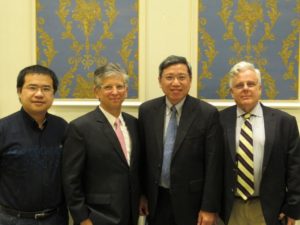 The IEEE Nanotechnology Council announces its 2019 Award Winners. Awards were presented at its 19th IEEE International Conference on Nanotechnology (IEEE-NANO 2019) held in Macau, China on 22-26 July 2019. The Council recognized recipients for its Pioneer, Early Career and Distinguished Service Awards, presented by the Council President, Prof. Tommy Tzeng.
The IEEE Nanotechnology Council announces its 2019 Award Winners. Awards were presented at its 19th IEEE International Conference on Nanotechnology (IEEE-NANO 2019) held in Macau, China on 22-26 July 2019. The Council recognized recipients for its Pioneer, Early Career and Distinguished Service Awards, presented by the Council President, Prof. Tommy Tzeng.
The recipient of the 2019 IEEE Nanotechnology Council Pioneer Award in Nanotechnology, is Paul S. Weiss, UC Presidential Chair and Distinguished Professor of Chemistry & Biochemistry and of Materials Science & Engineering at the University of California, Los Angeles. The recipient for the 2019 IEEE Nanotechnology Council Early Career Award is Professor Han Wang at the University of Southern California. The recipient for the 2019 IEEE Nanotechnology Council Distinguished Service Award is Professor Fabrizio Lombardi at Northeastern University, Boston.
PIONEER AWARD IN NANOTECHNOLOGY
The NTC Pioneer Award in nanotechnology is to recognize individuals who by virtue of initiating new areas of research, development or engineering have had a significant impact on the field of nanotechnology. The award is intended for people who are in the mid or late portions of their careers, i.e., at least 10 years beyond his or her highest earned academic degree on the nomination deadline date.
2019 Pioneer Award Recipient
The recipient of the 2019 IEEE Nanotechnology Council Pioneer Award in Nanotechnology, is Paul S. Weiss, UC Presidential Chair and Distinguished Professor of Chemistry & Biochemistry and of Materials Science & Engineering at the University of California, Los Angeles, with the citation:
“For exploring the ultimate limits of miniaturization and function and championing nanotechnology worldwide”
Prof. Weiss is known for determining the mechanism of function of the smallest switches and motors in the world. In order to do so, he has developed and applied new scanning probe microscopy tools that simultaneously measure structure, function, and spectra with submolecular resolution and new chemical patterning methods that add the chemical dimension to nanolithography and enable control ranging from the sub-Ångstrom to the wafer scale in the selective placement of chemical functionality. These tools and methods have broad applicability in many fields of science, engineering, and medicine. He is the founding and current editor-in-chief of the leading nanoscience journal ACS Nano and an international spokesperson for nanoscience and nanotechnology.
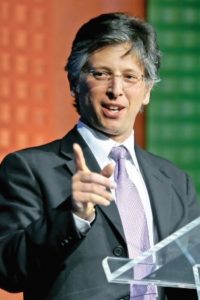
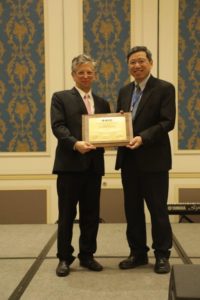 Paul S. Weiss holds a UC Presidential Chair and is a distinguished professor of chemistry & biochemistry and of materials science & engineering at UCLA. He received his S.B. and S.M. degrees in chemistry from MIT in 1980 and his Ph.D. in chemistry from the University of California at Berkeley in 1986. He was a postdoctoral member of technical staff at Bell Laboratories from 1986-88 and a visiting scientist at IBM Almaden Research Center from 1988-89. He served as the director of the California NanoSystems Institute and held the Fred Kavli Chair in NanoSystems Sciences at UCLA from 2009-14. Before coming to UCLA, he was a distinguished professor of chemistry and physics at the Pennsylvania State University, where he began his academic career in 1989. His interdisciplinary research group includes chemists, physicists, biologists, materials scientists, mathematicians, electrical and mechanical engineers, computer scientists, clinicians, and physician scientists. They focus on the ultimate limits of miniaturization, exploring the atomic-scale chemical, physical, optical, mechanical, and electronic properties of surfaces, interfaces, and supramolecular assemblies. They develop new techniques to expand the applicability and chemical specificity of scanning probe microscopies. They apply these and other tools to study self- and directed assembly, and molecular and nanoscale devices. They advance nanofabrication down to ever smaller scales and greater chemical specificity to operate and to test functional molecular assemblies, and to connect these to the biological and chemical worlds. Two major themes in his laboratory are cooperativity in functional molecules and single-molecule/assembly biological structural and functional measurements. He has written over 400 publications, holds over 30 patents, and has given over 700 invited, plenary, keynote, and named lectures.
Paul S. Weiss holds a UC Presidential Chair and is a distinguished professor of chemistry & biochemistry and of materials science & engineering at UCLA. He received his S.B. and S.M. degrees in chemistry from MIT in 1980 and his Ph.D. in chemistry from the University of California at Berkeley in 1986. He was a postdoctoral member of technical staff at Bell Laboratories from 1986-88 and a visiting scientist at IBM Almaden Research Center from 1988-89. He served as the director of the California NanoSystems Institute and held the Fred Kavli Chair in NanoSystems Sciences at UCLA from 2009-14. Before coming to UCLA, he was a distinguished professor of chemistry and physics at the Pennsylvania State University, where he began his academic career in 1989. His interdisciplinary research group includes chemists, physicists, biologists, materials scientists, mathematicians, electrical and mechanical engineers, computer scientists, clinicians, and physician scientists. They focus on the ultimate limits of miniaturization, exploring the atomic-scale chemical, physical, optical, mechanical, and electronic properties of surfaces, interfaces, and supramolecular assemblies. They develop new techniques to expand the applicability and chemical specificity of scanning probe microscopies. They apply these and other tools to study self- and directed assembly, and molecular and nanoscale devices. They advance nanofabrication down to ever smaller scales and greater chemical specificity to operate and to test functional molecular assemblies, and to connect these to the biological and chemical worlds. Two major themes in his laboratory are cooperativity in functional molecules and single-molecule/assembly biological structural and functional measurements. He has written over 400 publications, holds over 30 patents, and has given over 700 invited, plenary, keynote, and named lectures.
Weiss has been awarded a National Science Foundation (NSF) Presidential Young Investigator Award (1991-96), the Scanning Microscopy International Presidential Scholarship (1994), the B. F. Goodrich Collegiate Inventors Award (1994), an Alfred P. Sloan Foundation Fellowship (1995-97), the American Chemical Society (ACS) Nobel Laureate Signature Award for Graduate Education in Chemistry (1996), a John Simon Guggenheim Memorial Foundation Fellowship (1997), a NSF Creativity Award (1997-99), the ACS Award in Colloid and Surface Chemistry (2015), the ACS Southern California Section Tolman Medal (2017), the ACS Patterson-Crane Award in Chemical Information (2018), and the IEEE Nanotechnology Pioneer Award (2019), among others. He was elected a fellow of: the American Association for the Advancement of Science (2000), the American Physical Society (2002), the American Vacuum Society (2007), the ACS (2010), the American Academy of Arts and Sciences (2014), the American Institute for Medical and Biological Engineering (2016), the Canadian Academy of Engineering (2017), and an honorary fellow of the Chinese Chemical Society (2010). He was also elected a senior member of the IEEE (2009). He received Penn State’s University Teaching Award from the Schreyer Honors College (2004), was named a nanofabrication fellow at Penn State (2005), and won the Alpha Chi Sigma Outstanding Professor Award (2007). He was a visiting professor at the University of Washington, Department of Molecular Biotechnology (1996-97) and Kyoto University, Electronic Science and Engineering Department and Venture Business Laboratory (1998 and 2000), and a distinguished visiting professor at the Kavli Nanoscience Institute and the Joint Center for Artificial Photosynthesis at Caltech (2015). He is a visiting scholar at the Kavli Institute for Bionano Science & Technology and the Wyss Institute for Biologically Inspired Engineering at Harvard University (2015-18). He held the Institut National de la Recherche Scientifique (INRS) Chaire d’excellence JacquesBeaulieu (2016-17) and was a Fulbright Specialist for the Czech Republic (2017). Weiss was a member of the U.S. National Committee to the International Union of Pure and Applied Chemistry (2000-05). He has been the technical co-chair of the Foundations of Nanoscience Meetings and thematic chair of the Spring 2009 and Fall 2018 ACS National Meetings. He was the senior editor of IEEE Electron Device Letters for molecular and organic electronics (2005-07), and is the founding editor-in-chief of ACS Nano (2007-). At ACS Nano, he won the Association of American Publishers, Professional Scholarly Publishing PROSE Award for 2008, Best New Journal in Science, Technology, and Medicine, and ISI’s Rising Star Award a record ten times.
EARLY CAREER AWARD IN NANOTECHNOLOGY
The Nanotechnology Council has established an Early Career Award to recognize individuals who have made contributions with major impact on the field of nanotechnology. Up to two awards may be given per year. There may be one award for academics (persons employed by colleges or universities) and one for persons employed by industry or government organizations.
Early Career Award Recipient
The recipient for the 2019 IEEE Nanotechnology Council Early Career Award is Professor Han Wang at the University of Southern California, with the citation:
“For his key contributions to the study of black phosphorus and other two-dimensional materials, and their electronic and photonic applications”
Professor Han is a leading expert in the study of the fundamental properties of emerging nanomaterials and advanced nanoelectronic devices. He has made key contributions to the research in the properties of black phosphorus and other two-dimensional materials, and their electronic and photonic applications, as well as in leading the research community on developing two-dimensional materials for applications in beyond von-Neumann computing.
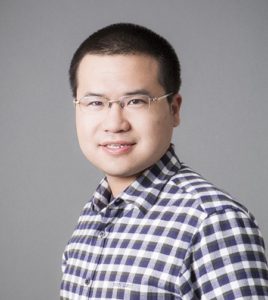
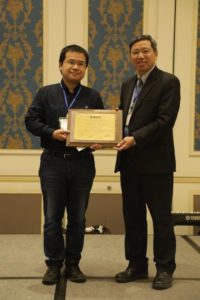 Han Wang is an Assistant Professor of Electrical and Computer Engineering and holder of the Robert G. and Mary G. Lane Early Career Chair at University of Southern California (USC). He received the B.A. degree in electrical and information science from Cambridge University in 2007 and his PhD degree from Massachusetts Institute of Technology (MIT) in 2013. From 2013 to 2014, he was with the Nanoscale Science and Technology group at IBM T. J. Watson Research Center. His research interests include the fundamental study and device innovation in electronics and photonics technology based on emerging nanomaterials for sensing, communication and computing applications. He is the recipient of numerous research and career awards including the Army Research Office Young Invesitgator Award, National Science Foundation CAREER award, the Roger A. Haken Best Paper Award in IEEE International Electron Device Meeting (IEDM), the Best Paper Award in International Conference on Compound Semiconductor Manufacturing Technology (CS MANTECH), USC Viterbi Junior Faculty Research Award, USC Zumberge Faculty Research Individual Award, and the MIT Jin-Au Kong Best Doctoral Thesis Award. He also received the Orange County Engineering Council (OCEC) Outstanding Educator Award for his contributions to the science and engineering education in the Los Angeles area. Dr. Wang has authored or coauthored more than 100 publications in distinguished journals and conferences.
Han Wang is an Assistant Professor of Electrical and Computer Engineering and holder of the Robert G. and Mary G. Lane Early Career Chair at University of Southern California (USC). He received the B.A. degree in electrical and information science from Cambridge University in 2007 and his PhD degree from Massachusetts Institute of Technology (MIT) in 2013. From 2013 to 2014, he was with the Nanoscale Science and Technology group at IBM T. J. Watson Research Center. His research interests include the fundamental study and device innovation in electronics and photonics technology based on emerging nanomaterials for sensing, communication and computing applications. He is the recipient of numerous research and career awards including the Army Research Office Young Invesitgator Award, National Science Foundation CAREER award, the Roger A. Haken Best Paper Award in IEEE International Electron Device Meeting (IEDM), the Best Paper Award in International Conference on Compound Semiconductor Manufacturing Technology (CS MANTECH), USC Viterbi Junior Faculty Research Award, USC Zumberge Faculty Research Individual Award, and the MIT Jin-Au Kong Best Doctoral Thesis Award. He also received the Orange County Engineering Council (OCEC) Outstanding Educator Award for his contributions to the science and engineering education in the Los Angeles area. Dr. Wang has authored or coauthored more than 100 publications in distinguished journals and conferences.
DISTINGUISHED SERVICE AWARD
The Distinguished Service Award recognizes an individual who has performed outstanding service for the benefit and advancement of the IEEE Nanotechnology Council.
Distinguished Service Award Recipient
The recipient for the 2019 IEEE Nanotechnology Council Distinguished Service Award is Professor Fabrizio Lombardi at Northeastern University, with the citation:
“For exceptional devotion to the duties and outstanding performance as the Editor-In-Chief of IEEE Transactions on Nanotechnology”
Under Professor Lombardi’s guidance as Editor in Chief, TNANO has experienced tremendous growth and success. This has been evidenced by continuous improvement in metrics including impact factor, selectivity of papers accepted for publication, and reduced paper review times. Professor Lombardi has streamlined the publication flow model at TNANO while revitalizing and expanding the editorial board.
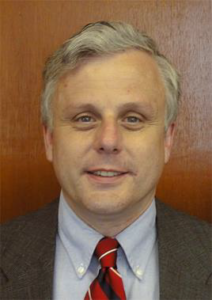
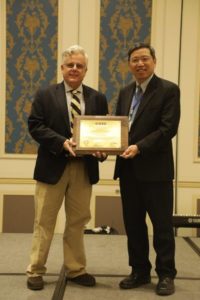 Fabrizio Lombardi graduated in 1977 from the University of Essex (UK) with a B.Sc. (Hons.) in Electronic Engineering. In 1977 he joined the Microwave Research Unit at University College London, where he received the Master in Microwaves and Modern Optics (1978), the Diploma in Microwave Engineering (1978) and the Ph. D. from the University of London (1982). He is currently the holder of the International Test Conference (ITC) Endowed Chair at Northeastern University, Boston. Currently, Dr. Lombardi is the Editor-in-Chief of the IEEE Transactions on Nanotechnology and a member of the Executive Board of the IEEE Nanotechnology Council and the IEEE Computer Society. He is also the Vice-President for Publications of the IEEE Computer Society and member of the IEEE Publication Services and Products Board (PSPB) He has been appointed on Executive Boards of the Computer Society (as an elected two-term member of its Board of Governors (2012-2017)) and the IEEE (as an appointed member of the Future Directions Committee (2014-2017)).
Fabrizio Lombardi graduated in 1977 from the University of Essex (UK) with a B.Sc. (Hons.) in Electronic Engineering. In 1977 he joined the Microwave Research Unit at University College London, where he received the Master in Microwaves and Modern Optics (1978), the Diploma in Microwave Engineering (1978) and the Ph. D. from the University of London (1982). He is currently the holder of the International Test Conference (ITC) Endowed Chair at Northeastern University, Boston. Currently, Dr. Lombardi is the Editor-in-Chief of the IEEE Transactions on Nanotechnology and a member of the Executive Board of the IEEE Nanotechnology Council and the IEEE Computer Society. He is also the Vice-President for Publications of the IEEE Computer Society and member of the IEEE Publication Services and Products Board (PSPB) He has been appointed on Executive Boards of the Computer Society (as an elected two-term member of its Board of Governors (2012-2017)) and the IEEE (as an appointed member of the Future Directions Committee (2014-2017)).
In the past Dr. Lombardi has been a two 2-year term Editor-in-Chief (2007-2010), Associate Editor-in-Chief (2000-2006) and Associate Editor (1996-2. 000) of the IEEE Transactions on Computers, the inaugural two-term Editor-in-Chief of the IEEE Transactions on Emerging Topics in Computing (2013-2017) as well as member of the Editorial Boards of the ACM Journal of Emerging Technologies in Computing Systems, the IEEE Design & Test Magazine and IEEE Transactions on CAD of ICAS. Dr. Lombardi has been twice a Distinguished Visitor of the IEEE Computer Society (1990-1993 and 2001-2004). He serves as Chair of the Committee on ”Nanotechnology Devices and Systems” of the Test Technology Technical Council of the IEEE.
Dr. Lombardi is a Fellow of the IEEE for ”contributions to testing and fault tolerance of digital systems”. He was the recipient of the 2011 Meritorious Service Award and elevated to Golden Core membership in the same year by the IEEE Computer Society; he is the Chair of the 2016 and 2017 IEEE CS Fellow Evaluation Committee. He has received many professional awards: the Visiting Fellowship at the British Columbia Advanced System Institute, University of Victoria, Canada (1988), twice the Texas Experimental Engineering Station Research Fellowship (1991-1992, 1997-1998) the Halliburton Professorship (1995), the Outstanding Engineering Research Award at Northeastern University (2004) and an International Research Award from the Ministry of Science and Education of Japan (1993-1999). Dr. Lombardi was the recipient of the 1985/86 Research Initiation Award from the IEEE/Engineering Foundation and a Silver Quill Award from Motorola-Austin (1996). Together with his students, his manuscripts have been selected for the best paper awards at technical events/meeting such as IEEE DFT and IEEE/ACM Nanoarch.
Dr. Lombardi has been involved in organizing many international symposia, conferences and workshops sponsored by professional organizations as well as guest editor of Special Issues in archival journals and magazines. His research interests are emerging technologies (mostly nanoscale circuits and magnetic devices), VLSI design and fault/defect tolerance of digital systems. He has extensively published in these areas and coauthored/edited ten books.
Tags: Council Awards, Distinguished Service Award, Early Career Award, Pioneer Award
